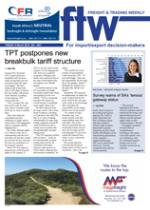Transnet Port Terminals’
(TPT) controversial new
breakbulk tariff structure –
where all quayside costs are
to be thrust upon the cargo
owner/agent – has been
delayed until at least midyear,
as TPT plans to discuss
the issue further with private
sector interests, according
to Don Maclean, TPT’s
commercial GM.
“This,” he told FTW, “has
been on the cards for some
time. There’s currently a split
tariff, but we want to combine
them.
“But I don’t think the
consultation has been
sufficiently in-depth, and we
need to have a full engagement
with our customers and the
shipping lines.”
Part of this, Maclean added,
is to “achieve some sort of
understanding with the lines”,
and make sure that they refund
the invoicees for any costs that
the lines are committed to in
the transport contracts.
When TPT first made the
proposed new tariff structure
public (FTW, January 27,
2012) it was met with a mixed
response. On the shipping line
side, there was a qualified
acceptance, although some
doubts were expressed. But on
the cargo owners/agents side,
the response was violently
against.
As maritime adviser to the
SA Association of Freight
Forwarders (Saaff) Dave Watts
said (speaking on his own
behalf): “This is a retrograde
step that will result in an
overall increase in breakbulk
ocean supply chain costs.”
The latest objection from
the cargo owners’ side is from
Doron Friedman, consultant
to Clyde Steel, who told FTW
that, in 25 years of trading
internationally for many large
trading companies around the
world, he had never seen a
similar case of conflict with
the internationally accepted
trading terms.
“The TPT proposal conflicts
with Incoterms – which are
the internationally accepted
trading terms used by all
institutions and traders,
importers and exporters as
well as banks, shipping lines,
and insurance companies,” he
added.
“The conflict lies in the
transfer of responsibilities.
Under Incoterms CFR – LO
(cost and freight – liner out)
the responsibility for the cargo
lies in the shippers’ hands to
discharge the material on to
the quay side, and the cost
thereto.”
Should this TPT proposal
be implemented, he added, the
result would be that the SA
ports would be the only ports
in the world, to his knowledge,
that would place the
responsibility on the shipper –
but the costs on the receiver.
“As a matter of logic,”
Friedman said, “one
cannot transfer costs and
responsibilities away from
each other. This for the
obvious reason that they are
inextricably linked, and you
lose your leverage over the
executing party if you do not
control the financial flow –
which, in turn, controls the
actual work.”
His second objection
is the fact that Incoterms
already allows for this type of
transaction – that is, the
His second objection
is the fact that Incoterms
already allows for this type
of transaction – that is, the
receiver being responsible
for the charges as well as the
responsibility of the discharge
of the cargo.
This, he noted, falls under
the incoterm CFR – FO (cost
and freight – free out).
This shifts the responsibility
and the accountability to the
receiver, as opposed to the
CFR LO term where it applies
to the shipper.
“Should one party have
the responsibility and another
the accountability, then there
would be considerable cause
for dispute whenever things
do not run smoothly,” said
Friedman. “This would see
the accountable party always
carrying the onus – as they
would be out of pocket in all
instances – and the responsible
party always in a position to
walk away. And remember
that this responsible party is
not a local, but an international
one – and it would thus be
extremely difficult to enforce,
given that they are not bound
by SA law.”
Friedman also highlighted
another important point of
conflict.
When buying on a
CFR FO basis, he noted,
it is the responsibility and
accountability of the receiver
to discharge the cargo.
However, when there are
several receivers on a single
vessel, you would have many
stevedoring companies all
jockeying for position to
discharge on time in order not
to face penalties.
“This, Friedman said,
“because the receiver holds
their funds and discharge
contract terms.
“In turn, this places
immense pressure on the
vessel and its crew to collate
all these parties to discharge
simultaneously – not to
mention the safety issue that
this would create.”
It would also create
confusion and control issues
with the ship itself.
“This,” Friedman added,
“is the reason why shipowners
generally do not allow
minority shippers to contract
on a CFR FO term – because
it would cause delays in the
port, - ultimately translating
into additional costs to the
shipowners.”
Friedman does not disagree
with TPT’s motivation to
streamline its operations to
become more efficient. “But it
cannot achieve this by passing
the buck to the receivers
without consideration to all
the other parties concerned –
or considering international
trade terms and conditions and
practices,” he said.
Should such a system be
implemented, according to
Friedman, the end result would
be that breakbulk ships would
rather call on other ports – and
freight rates to SA ports would
increase to allow for these
problems and delays.
TPT postpones new breakbulk tariff structure
09 Mar 2012 - by Alan Peat
0 Comments
FTW - 9 Mar 12

09 Mar 2012
09 Mar 2012
09 Mar 2012
09 Mar 2012
09 Mar 2012
09 Mar 2012
09 Mar 2012
09 Mar 2012
09 Mar 2012
09 Mar 2012
Border Beat
Featured Jobs
New
New
New
